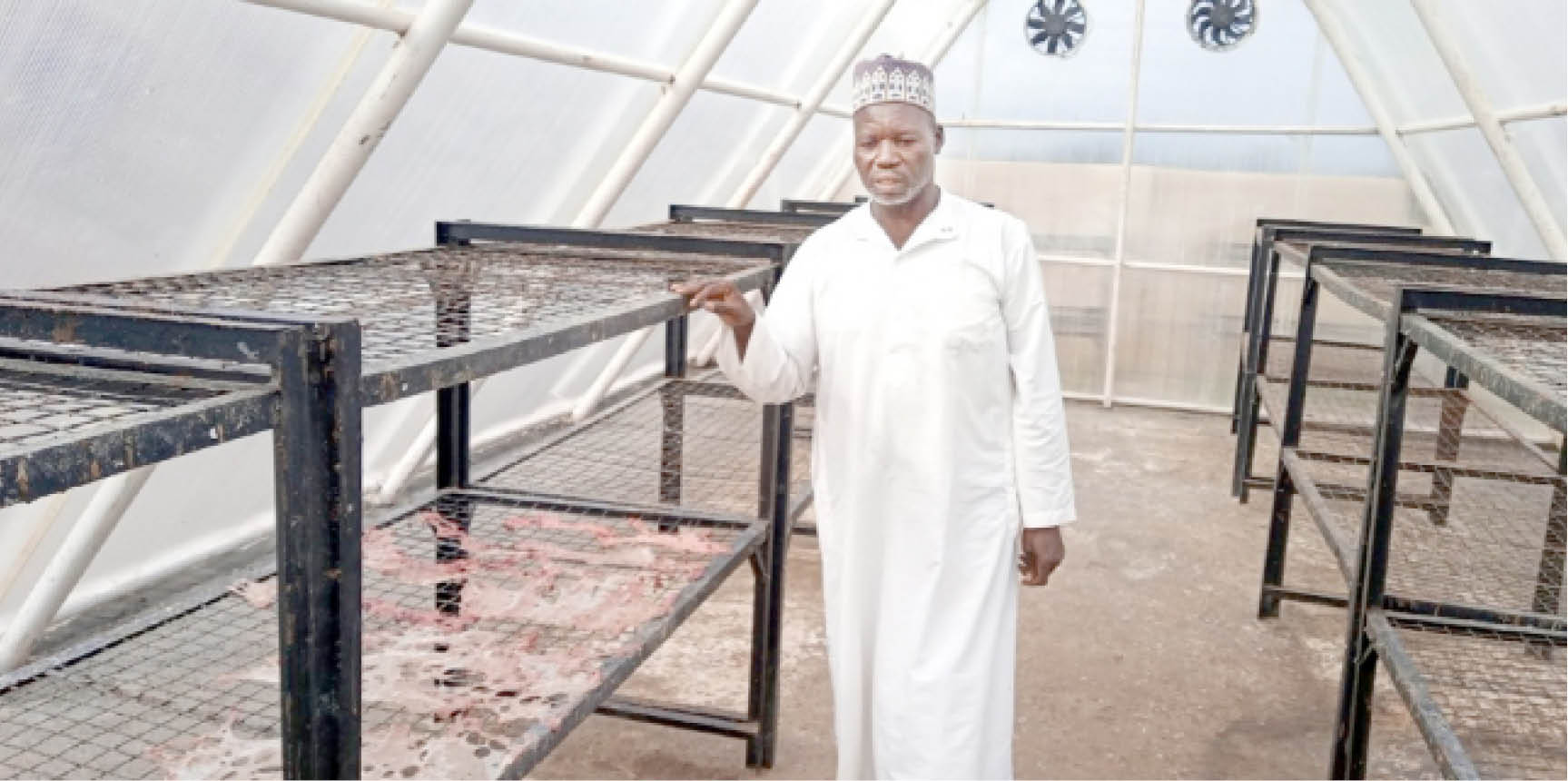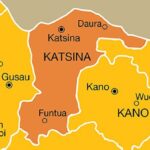A solar-powered factory meant for processing of Kilishi (a local meat delicacy) built at Mararrabar Kankara community in Malumfashi Local Government Area of Katsina State had started touching lives positively in the surrounding communities, Daily Trust reports.
The factory – yet to be officially commissioned – is built on a 2-hectare piece of land donated by the Katsina State government as confirmed by the Nigeria Erosion Watershed Management Project (NEWMAP) coordinator in Katsina, Engr Ashiru Muhammad.
- Food security: CBN disburses N791bn to 3m farmers
- ActionAid trains youths on agricultural innovation
“Katsina State has supported the project with 2 hectares of land and it is only a portion of the land that is used, which means there is room for expansion. The state also paid compensation to the land owners who had already planted crops on the piece of land.
“The project was executed with the Special Climate Change Fund (SCCF) which is a World Bank Grant to support climate change in Nigeria, out of which Katsina benefitted.

“The factory project was handled by NEWMAP through the Federal Project Management Unit and supervised by Katsina office of NEWMAP,” Muhammad explained.
The Project Secretary, Malam Surajo Salisu, who is also NEWMAP Geographic Information System (GIS) officer, explained that the factory which has parameter fencing, consist of two solar-powered drier-domes (for drying the meat), fuel-efficient kilns (for smouldering of kilishi), solar-powered borehole which serve both the factory and surrounding communities as well as office blocks.
Daily Trust gathered that the project was completed and handed over to the community through the association of the Kilishi producers under the name “Kilishi Producers Cooperative Society Limited Mararrabar Kankara.”
Improved production
The solar powered factory has led to a cut in production time from an average of 3-4 days to 3 hours (at peak sunshine); an increase in production capacity – 1,600 kg of meat (about the amount of beef from 8 cows) can now be processed per day – same quantity would take 20 Kilishi makers 2 weeks using the traditional sun-drying method. While production was barely sufficient for domestic consumption earlier, Kilishi is now being exported to customers in other states such as Kano, Gombe, Abuja, and Lagos among others.
Alhaji Haruna Lawal is the chairman of the association. He told our reporter that his members have seen tremendous positive changes with the establishment of the factory.
“This is a business that we inherited from our great grandfathers, and it had always been the same way, with the work relatively easy during dry season, but really difficult during rainy season like this, where it takes nothing less than four days for us to prepare kilishi even of small quantity.
“But with this factory, not minding the quantity, everything is done within a few hours and ready for consumption on the same day.
A more hygienic processing
Processing and drying Kilishi in solar drying domes eliminates the hard labour of doing so in the open air with the constant threat of rain, dust, flies, and birds contaminating the meat. The improved hygiene and taste of the solar-powered Kilishi has also increased its market value.
“Another thing is that in the past, we used local beddings, made of cornstalks, to dry the meat outdoors, and you see flies and dust covering it, which is unhygienic. But now, everything is done indoors under strict hygienic condition,” he said.
“Equally, in the past, we needed lots of firewood to smoke the meat after drying, but with these kilns now, all we need is a little charcoal to do that and that has reduced the cost by about 70 per cent. It is easier and more profitable,” he added.

Chairman Lawal also said that
with the establishment of the factory, some of their young men who migrated to other states for the business have returned to do it with ease and then transport it back to their states of residence.
‘We trade an average of N10m weekly’
The chairman also explained that their association trades an average of N10m every week with the new technology, and that translates to an average of N480m a year.
“If not for lack of enough capital, with this technology now, we can process up to 40 small ruminant animals and at least 15 cows a day, and you can imagine how huge the amount of money that is going to be,” he said.
Why the project?
The NEWMAP project coordinator explained that Nigeria has one of the highest rates of deforestation in the world, having lost 2 million hectares of forest cover in 5 years according to Conservation International.
He said tree-felling and bush-burning also accelerate the land degradation and desertification processes already driven by climate change.
“To combat this, the government of Katsina State, with support from the World Bank-financed NEWMAP, decided to build the solar-powered Kilishi factory. In addition to conserving firewood, the factory is demonstrating the potential for job creation for youth who would have otherwise migrated to cities in other states.
In 2020, the Katsina State government partnered with the NEWMAP project to demonstrate a sustainable and innovative way of making Kilishi without charcoal and firewood. The initiative built a solar-powered Kilishi factory with solar-powered meat drier domes, fuel-efficient kilns, heat extractors, security lights, borehole, and an office; bringing prosperity quickly to the local community, and creating employment opportunities for the youth who would have otherwise migrated to cities in other states,” he said.
One of the beneficiaries of the project, Ibrahim Bature, said few months earlier, he migrated to Abuja, making N50,000 a month, a sum barely enough to sustain him and his family back home, but he had returned to work in the new factory and is earning three times what he was earning in Abuja.
“We have returned home because of the factory. I earn over N150,000 per month. I am able to help others and our parents to pay school fees of our younger ones which they could not do in the past – leading to a lot of problems including sending them out of school,” Bature said.
Creating employment opportunities
The chairman, Alhaji Lawal, said apart from the number of members of the association, which has grown from 20 to 96, there are lots of other members of the community who are benefiting from the project.
“Apart from the members of the Cooperative, who are the primary beneficiaries, several other people have benefited. They include cattle sellers, animal skin buyers, suppliers of packaging material, oil sellers, our office staff, security guards, cleaners and the women who supply the chilly, and groundnut cake powder among many others in the value chain,” he said.

Women empowerment
With the establishment of the new factory, more women at home have gotten a source of income by producing and supplying Kuli (Groundnut powder) to the factory. The butchers buy these items from the women.
The chairman said at least 50 women are supplying the powder and that has significantly improved their livelihood.
Malama Hassana Sulaiman Marrabar Kankara said a lot of women had little or no source of income, but with the new factory, many have been engaged and it has improved their economic activities.
“In the past, those of us that are into kuli production were not processing more than four to five measures of groundnut, but I can assure you now that some of us use up to a full bag while other process a half bag. That is indeed a significant improvement,” she said.
It’s hygienic and tastier – customer
Dr Aliyu Zahradden, a veterinary doctor, said Kilishi is his favourite delicacy and from the moment the new factory started production, he ceased to buy from roadside as he was more comfortable with the hygienic nature as well as the taste of the one produced in the factory.
“The technology is good, the processing is improved from local to a very big business and as you can see, the whole place is neat. From the moment I tasted their kilishi, I always stop over on my way to Katsina to buy from them,” he said.
On his part, the village head of Yaba, who oversees Marabar Kankara, expressed gratitude to the World Bank, NEWMAP and the Katsina State government for the project, saying it has significantly improved the lot of the people of the area.
“We had a meeting and decided that whosoever is making Kilishi, no matter how small, must come to this place, as failure to do that will attract a fine, and our butchers have cooperated and we are really happy about it.
“We have also extended the offer to other towns that are into this kind of business to come and pay a little token to process their meat,” he said.
He called on the government to support the processors in such a way that they could export the delicacy to other countries.
Daily Trust also gathered that apart from Mararrabar Kankara, Kilishi is massively produced in places like Kayauki village and Kankiya in Katsina State.




